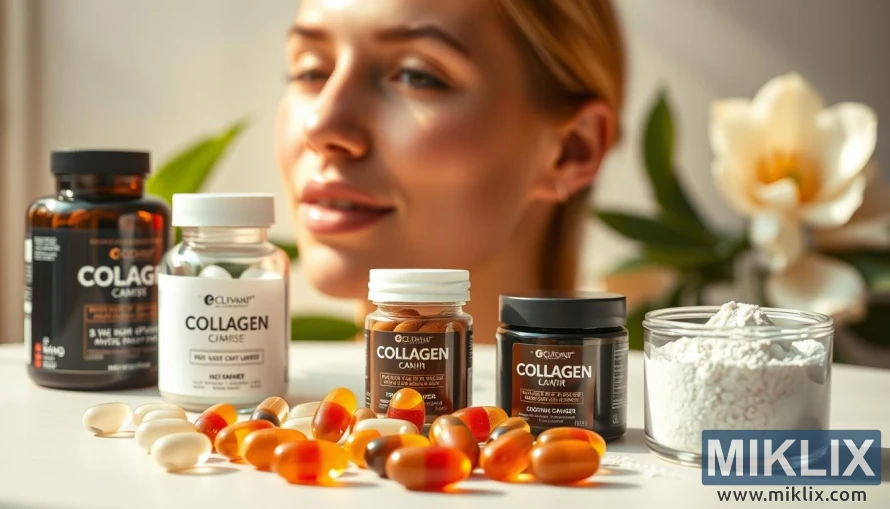From Skin to Joints: How Daily Collagen Gives Your Whole Body a Boost
Published: June 24, 2025 at 10:42:57 AM UTC
Collagen supplements have become a staple in the wellness community, celebrated for their remarkable benefits. This naturally occurring protein plays a vital role in maintaining healthy skin and supporting joint health. As the most abundant protein in the human body, its significance cannot be overstated. By incorporating collagen supplements into your daily regimen, you may enhance your skin's elasticity and promote overall wellness. This article explores the benefits of collagen supplements and their impact on your body. We will focus on how they work, their sources, and the scientific research backing their effectiveness.

Key Takeaways
- Collagen supplements may improve skin hydration and elasticity.
- They support joint health by maintaining cartilage and connective tissues.
- Consistent use can enhance overall wellness and vitality.
- Collagen production decreases with age, making supplements increasingly beneficial.
- Research supports the positive effects of collagen on health and beauty.
What is Collagen?
Collagen is the most abundant protein in the human body, accounting for about 30% of total body protein. It acts as the primary building block for various structures, including skin, muscles, bones, tendons, ligaments, and other connective tissues. Its composition is key; it's made up of amino acids like proline, glycine, and hydroxyproline. These amino acids form a triple helix structure, essential for collagen's functionality.
Collagen protein plays several vital roles in the body. It provides strength and elasticity to the skin, helping it retain moisture and resist wrinkles. It also supports the regeneration of cells and aids in the proper functioning of vital organs. As a foundation for connective tissues, collagen is indispensable for maintaining overall bodily integrity and health.
Types of Collagen and Their Roles
Collagen is vital for the body's structural integrity. It comes in 28 types, with five major ones playing key roles in support and flexibility.
The primary collagen types and their functions are as follows:
- Type I: Making up 90% of the body's collagen, it structures skin, bones, tendons, and ligaments.
- Type II: Found mainly in elastic cartilage, it cushions joints, promoting health and flexibility.
- Type III: Linked to muscles, arteries, and organs, it supports tissue structure and elasticity.
- Type IV: In skin layers, it forms the basal lamina, essential for skin health.
- Type V: In the cornea, skin layers, and hair, it helps distribute and organize collagen fibers.

Knowing about these collagen types and their roles boosts understanding of connective tissue health. Each type is designed for specific functions, ensuring the body's structural integrity.
Why is Collagen Important for Your Body?
The role of collagen in maintaining health is immense. It serves as a foundational protein for various tissues, providing a strong framework for the body. Beyond structural support, collagen enhances skin elasticity, promotes joint health, and boosts bone strength.
As we age, our collagen production dwindles, causing wrinkles, sagging skin, joint pain, and stiffness. This decline underlines collagen's role in both physical appearance and functional health. Consuming collagen regularly can help replenish levels, support the replacement of dead skin cells, and aid in blood clotting.
Collagen also protects organs, ensuring they are well-supported and secure within the body. Recognizing the importance of collagen and its functions empowers individuals to make informed choices about supplementing their diet for enhanced health.
Benefits of Collagen Supplements
Collagen supplements bring numerous benefits that enhance health in various ways. They are highly valued for their positive effects on skin health and joint pain relief. Many people see the advantages of using these supplements.
- Improvement in skin elasticity and hydration contributes to a more youthful appearance.
- Relief from joint pain and symptoms of osteoarthritis enhances mobility and overall quality of life.
- Support in preventing bone density loss could lower the risk of osteoporosis.
- Assistance in maintaining muscle mass during aging and exercise promotes physical strength.
- Enhancement of overall hair and nail health reflects a holistic approach to beauty.
Users often notice significant improvements with regular use. This makes collagen supplements a favorite among those seeking to enhance their well-being.

How Collagen Supplements Work
Collagen supplements are available in powders, pills, or liquids, often as hydrolyzed collagen or collagen peptides. They work by being absorbed in the gastrointestinal tract. This absorption process is key to breaking down these peptides into usable forms by the body. It stimulates natural collagen production.
The absorption of amino acids is vital for synthesizing new collagen. These amino acids are essential for maintaining skin elasticity and joint function. Many people turn to collagen supplements to counteract aging effects, as natural collagen production decreases with age.
Adding collagen peptides to your daily routine can greatly enhance your overall health. They provide the body with the necessary components for collagen synthesis. This supports youthful skin and resilient joints. It encourages the body's natural collagen production, a key factor in health and vitality.
Collagen Production: Aging and Decline
As we age, a significant drop in collagen production is observed, most pronounced after 60 and during menopause in women. This natural aging process leads to the creation of lower quality collagen fibers. As a result, the aging effects on collagen become apparent, causing skin sagging, joint pain, and stiff connective tissues.
Menopause exacerbates this decline due to hormonal changes that further reduce collagen synthesis. Lifestyle factors also play a role in collagen degradation. Smoking, excessive sugar intake, and prolonged UV exposure can hasten collagen decline. This highlights the importance of preventive measures, such as supplementation and dietary adjustments, to counteract these effects.
Sources of Collagen
Collagen is a vital protein found in various sources. Understanding these sources is key to boosting natural collagen levels. Adding collagen-rich foods to your diet can improve skin elasticity and joint health.
Here are some excellent collagen sources:
- Bone broth, made by simmering animal bones and connective tissues, is a great way to derive collagen.
- Fish and chicken skin are rich in natural collagen.
- Red meats, like tougher cuts, offer more collagen benefits.
To enhance collagen production, it's vital to consume a variety of vitamins and minerals. Vitamins like C, zinc, and copper in fruits and vegetables are essential for collagen synthesis.
Potential Side Effects of Collagen Supplements
Most people find collagen supplements easy to digest. Yet, some might experience mild stomach issues. These can include nausea and bloating. Knowing about these side effects helps users gauge their body's reaction.
Another factor to consider is the collagen's source. If it comes from fish or eggs, it might trigger allergies in sensitive individuals. Those with allergies should always check the ingredient list to avoid adverse reactions.
The FDA doesn't oversee collagen supplements, which can be a concern. It's vital to choose products from reliable brands. This approach helps avoid contamination and ensures accurate labeling. Being well-informed can help users manage any side effects and enjoy a safer experience.
Research Supporting Collagen Benefits
Scientific studies on collagen have uncovered a variety of benefits linked to its use. Research suggests that collagen peptides can improve skin hydration and elasticity. Clinical trials have also shown significant benefits for those with joint pain, including those with osteoarthritis.
The body of evidence is growing, with ongoing randomized controlled trials and observational studies. These studies reveal promising results in skin texture, hydration, and joint mobility. Further research is needed to fully understand and validate collagen's health benefits.
Collagen and Overall Wellness
Collagen's role extends far beyond skin and joint health. Research suggests it could positively impact overall wellness, touching on gut health and mental well-being. It supports healthy blood vessels, which is key to heart health, showing its broad impact on the body.
Adding collagen to your daily routine can bring numerous wellness benefits. It not only boosts physical strength but also enhances internal system function. This protein maintains cellular integrity, leading to increased vitality and stress resilience, focusing on holistic health.
For those aiming to improve their health, collagen supplements might be a valuable addition. As more people learn about collagen's benefits, its role in holistic health becomes more recognized.

How to Choose Quality Collagen Supplements
When selecting collagen supplements, it's essential to evaluate several key factors for optimal benefits. Start by examining the ingredients. Look for products containing collagen peptides from trusted sources like grass-fed or wild-caught animals. This choice can greatly affect the supplement's quality.
Transparency is also critical in your decision. Choose brands that clearly outline their sourcing and manufacturing methods. A reliable supplement should detail how collagen is extracted, processed, and packaged.
Certifications are another important consideration. Opt for supplements that are non-GMO and purity-tested. Third-party certifications ensure the product adheres to safety and quality standards. Customer reviews can also guide you to the most effective collagen brands.
By considering these elements, you can make well-informed choices. This will enhance your overall wellness routine.
Conclusion
Collagen supplements offer a promising solution for those seeking to improve skin elasticity, reduce joint pain, and enhance overall health. The current research suggests positive outcomes, though more studies are needed to fully grasp its effectiveness. This summary highlights the benefits of incorporating collagen into your daily routine.
As natural collagen production decreases with age, supplementing can be beneficial. A diet rich in nutrients that support collagen synthesis can also amplify these benefits. This combination creates a powerful approach to maintaining health and vitality.
Choosing the right collagen supplements is key to navigating the aging process effectively. With the wealth of information available, individuals can leverage collagen to support a healthier, more vibrant life. This knowledge empowers you to make informed decisions about your well-being.
Further Reading
If you enjoyed this post, you may also like these suggestions:
- How Goji Berries Can Transform Your Health and Energy Levels
- Blueberries: Nature’s Tiny Health Bombs
- Barley Benefits: From Gut Health to Glowing Skin
